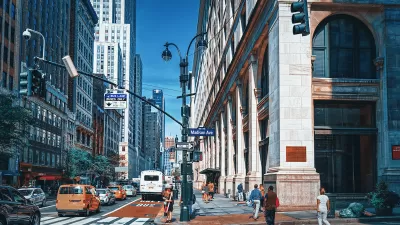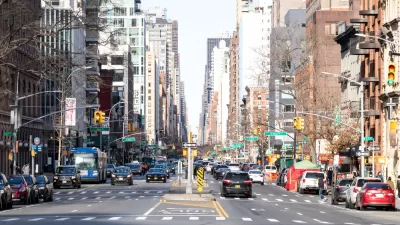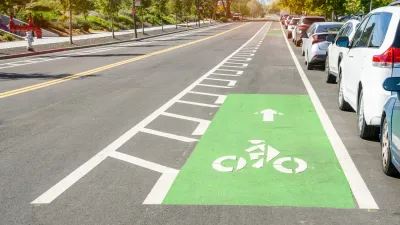With congestion pricing projected to reduce the number of cars entering Manhattan, NYCDOT plans to repurpose street space to build more pedestrian and bike infrastructure.

In advance of the city’s new congestion program, set to launch on June 30, the New York City Department of Transportation unveiled 37 proposed street safety projects that include bus lanes and bike lanes, reports Dan Zukowski in Smart Cities Dive.
Many of the projects are focused in Manhattan’s congestion pricing zone. In a statement, New York City Transportation Commissioner Ydanis Rodriguez said “With fewer cars entering the tolled zone, we can repurpose street space to make commuting by bus, bike, or on foot safer, faster, and more reliable.”
Zukowski notes that projects located outside of Manhattan could meet local opposition, pointing to a Bronx busway scrapped by the Adams administration after facing pushback from some local businesses and institutions.
FULL STORY: New York City to add dozens of new bus lanes and bike lanes

Rethinking Redlining
For decades we have blamed 100-year-old maps for the patterns of spatial racial inequity that persist in American cities today. An esteemed researcher says: we’ve got it all wrong.

Planetizen Federal Action Tracker
A weekly monitor of how Trump’s orders and actions are impacting planners and planning in America.

Walmart Announces Nationwide EV Charging Network
The company plans to install electric car chargers at most of its stores by 2030.

Seattle’s Pike Place Market Leans Into Pedestrian Infrastructure
After decades of debate, the market is testing a car ban in one of its busiest areas and adding walking links to the surrounding neighborhood.

The World’s Longest Light Rail Line is in… Los Angeles?
In a city not known for its public transit, the 48.5-mile A Line is the longest of its kind on the planet.

Quantifying Social Infrastructure
New developments have clear rules for ensuring surrounding roads, water, and sewers can handle new users. Why not do the same for community amenities?
Urban Design for Planners 1: Software Tools
This six-course series explores essential urban design concepts using open source software and equips planners with the tools they need to participate fully in the urban design process.
Planning for Universal Design
Learn the tools for implementing Universal Design in planning regulations.
City of Moorpark
City of Tustin
City of Camden Redevelopment Agency
City of Astoria
Transportation Research & Education Center (TREC) at Portland State University
Regional Transportation Commission of Southern Nevada
Toledo-Lucas County Plan Commissions





























